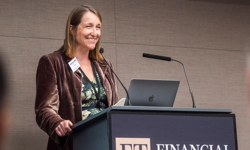
In a letter to Labour’s Shadow Secretary of State for Digital, Culture, Media and Sport, Tom Watson MP, PPA Managing Director Owen Meredith said the plan to establish a new British Digital Corporation (BDC), funded by a levy on large tech platforms, risked “the total collapse of independent journalism in the UK”. He added that it showed a “complete lack of understanding of publishers’ business models and how publishers have sought to diversify revenues in the digital age”.
In his speech, according to the PPA, Mr Corbyn set out a number of specific proposals:
* Establish a British Digital Corporation – establish a new sister organisation to the BBC to rival Netflix and Amazon in order to “harness data for the public good”. It could become the access point for information and content currently held in the BBC Archives, the British Library and the British Museum. Through the BDC, people would have free access to information that is often behind a paywall, with Mr Corbyn adding that advertisers would “no longer have the power to decide what people are looking at”.
* Grant charitable status for some journalism – Labour will consider granting charitable status to some local, investigative and public interest journalism, targeted at not-for-profit organisations. Mr Corbyn commented, “This type of journalism needs support and the government has a role helping to develop a business model to strengthen and underpin it.”
* New levy on digital platforms – Mr Corbyn proposed “tapping up the digital monopolies that profit from every search, share and like we make…or a windfall tax on the digital monopolies to create a public interest media fund”.
* Digital licence fee – In addition to the levy above, Labour would supplement the BBC licence fee with a digital licence fee collected from tech giants and internet service providers to fund “a democratised and more plural BBC to compete with the private sector digital giants like Netflix, Amazon, Google and Facebook.”
* Electing Editors – In order to “reduce the power of media bosses and owners”, Labour will consider giving journalists the power to elect Editors and give seats on boards for workers and consumers when a title or media brand becomes “particularly large or influential”.
* Media ownership – A limit was proposed on the number of media outlets/brands an individual or company can own.
The letter, copied to Mr Corbyn, welcomes the transparency with which Labour set out the party’s approach to media policy and the candour with which he has invited further discussion on his proposals.
Mr Meredith commented: “We welcome Mr Corbyn setting out Labour’s plans and look forward to engaging with the party to help develop these policies further. However, there are some ideas put forward here that are deeply concerning. The idea that a future Labour government would use assets deposited in the British Library under legal deposit in order to create a new state-backed media platform will be worrying for publishers. These comments show a complete lack of understanding of publishers’ business models and the purpose of the British Library. I hope they are urgently reconsidered.
“It is also concerning that a future Labour government feels that the BBC should be funded further in order to compete with the private sector. The BBC is uniquely funded and has a corresponding Charter Duty to provide distinctive services from those provided elsewhere, with particular regard to the effects of its activities on competition. With the expansion of BBC’s services in a highly competitive and diverse digital marketplace, the BBC’s online content often competes with commercial services offered by PPA members. Further digital expansion would bring additional challenges for publishers in monetising digital audiences and could be highly damaging to media plurality in the UK.”
He added: “Mr Corbyn has rightly highlighted the unfair relationship between monopolistic tech platforms and the publishers who create the content they monetise. Large tech platforms exploit their position without passing a fair share of value down the chain to content creators. The PPA has called on the Competition and Markets Authority to investigate the value chain in digital advertising to ensure publishers are properly rewarded for that content – Labour should support that call. The idea of a publicly controlled media fund to subsidise journalism sits uneasily with a free press that can act with true independence, free of political interference or state control.”
“Labour proposals on media ownership could be hugely damaging for brand plurality in magazine media and business information, particularly in today’s economic climate. The UK has a healthy independent publishing sector, but larger publishing houses are essential to sustain a greater diversity of brands by sharing back-office costs and the benefits of economies of scale. Acquisitions offer an important lifeline to magazine titles and media brands, which would otherwise face closure, by enhancing consumer choice and plurality,” Mr Meredith continued.












